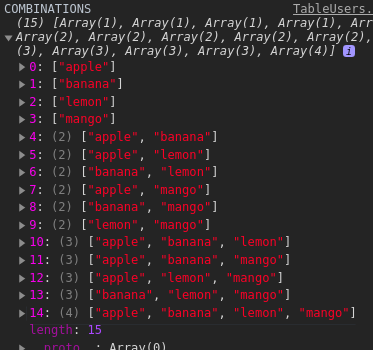I've seen several similar questions about how to generate all possible combinations of elements in an array. But I'm having a very hard time figuring out how to write an algorithm that will only output combination pairs. Any suggestions would be super appreciated!
Starting with the following array (with N elements):
var array = ["apple", "banana", "lemon", "mango"];
And getting the following result:
var result = [
"apple banana"
"apple lemon"
"apple mango"
"banana lemon"
"banana mango"
"lemon mango"
];
I was trying out the following approach but this results in all possible combinations, instead only combination pairs.
var letters = splSentences;
var combi = [];
var temp= "";
var letLen = Math.pow(2, letters.length);
for (var i = 0; i < letLen ; i++){
temp= "";
for (var j=0;j<letters.length;j++) {
if ((i & Math.pow(2,j))){
temp += letters[j]+ " "
}
}
if (temp !== "") {
combi.push(temp);
}
}


